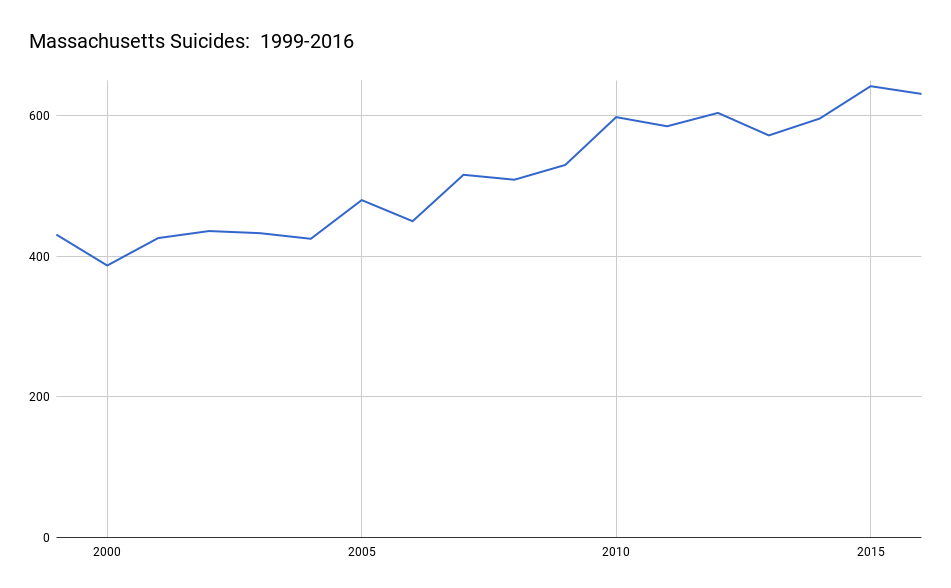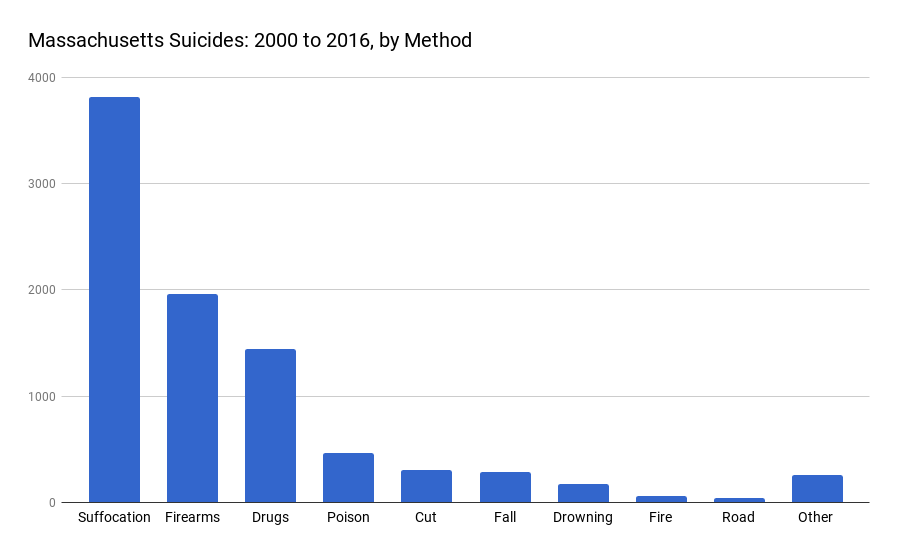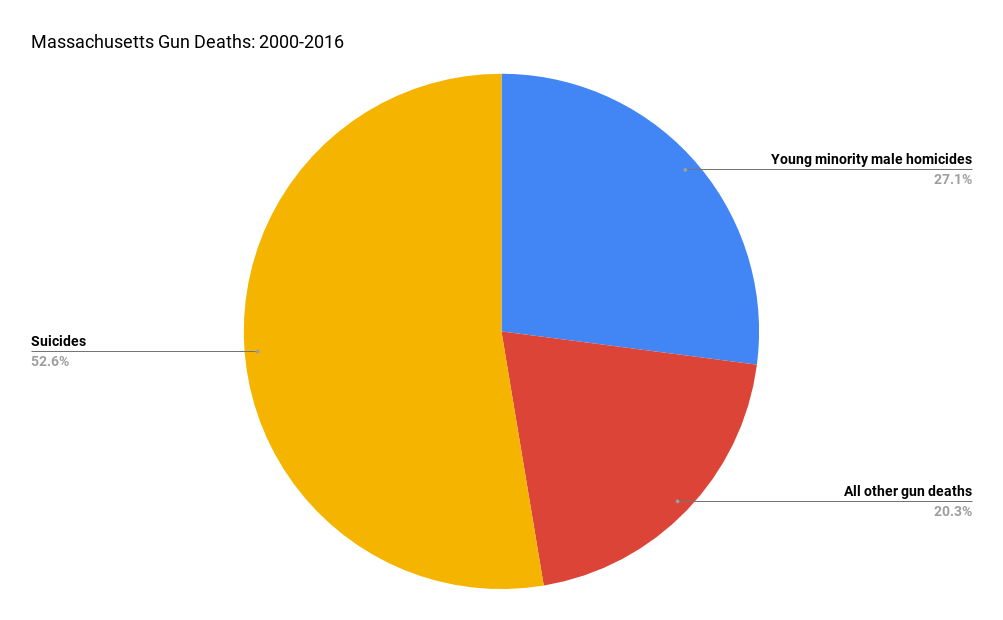Update — July 2018
Conferees from the two branches agreed on ERPO legislation and it was signed by the Governor.
The House and Senate have both now given initial approval to legislation to make it easier to take guns away from people who are a risk of harming themselves or others. It will likely be finalized and enacted before the end of this session.
We already have strong laws that allow a person to seek protection of the court, including removal of firearms, when he or she fears violence from a partner. And school shootings are hard to predict.
The best argument for the new legislation is that it will reduce the dominant but least visible category of gun death: suicide. Suicide in Massachusetts has risen 35% since 1999 — a troubling rise that is mirrored in other states. In Massachusetts, over the 17 years from 2000 through 2016, there were 3,736 deaths due to firearms. Of these, 1,966 or 52% were suicides. (Except when otherwise noted, death statistics in this post are computations based on data extracted from the CDC website on June 8, 2018.)

Under the legislation, if relatives or certain others become aware of severe depression and suicidal thoughts on the part of a gun owner, they will be able to go to court to urge a judge to remove the weapons. Police authority arguably exists to remove weapons in these circumstances, but the new legislation gives some procedural clarity. It will be especially helpful when there is a need to act swiftly.
If people, at their most desperate moment, use a gun to attempt suicide, the chances are that they will succeed. In one study in the Northeast, 91% of suicide attempts by gun were successful. The other easy way to attempt suicide — self-poisoning with drugs — is much less effective: In the same study, poisoning accounted for 74% of the attempts, but only 14% of the fatalities. (Suicides by hanging/suffocation are more common than firearm deaths in Massachusetts and are all too successful, but they are hard to control.)
While people who fail at suicide are at relatively high risk to make another attempt, one meta-analysis found that only 18% re-attempted within one year and that after nine years, only 7% had died by suicide. Preventing the impulsive trigger-pull may give someone a new long-term lease on life.

As compared to other states, Massachusetts has a relatively low rate of household gun ownership and a correspondingly low rate of suicide by gun, but firearms do account for 22% of successful suicides in Massachusetts (1,966 of 8,820 suicides from 2000 to 2016).
Firearm suicide is especially a problem among older white males. In Massachusetts, firearm suicide is 13 times more common among males than among females and 2 times more common among whites than among blacks. The risk rises with age.
The other major category of gun death, also all too often relegated to a back page of the papers, is gun violence among young minority males. Death by shooting is 8 times more common among males than females and 10 times more common among blacks than among whites. Risk is highest for people in their 20s. Although they are a small fraction of the population, black and Hispanic males aged 15 to 35 accounted for 59% of all the firearms homicides in the state from 2000 through 2016 (1,011 of the 1,714 intentional gun homicides). The risk of gun death among black males 20-24 is 25 times higher than the risk of gun death for non-Hispanic white males in the same age bracket.

Our recent legislation will do nothing to reduce the problem of urban gun violence. That’s a larger problem to which we devote significant resources — education, summer jobs, gang outreach, law enforcement, corrections. Doing more to bring young people back on track has to remain one of our central concerns.
The legislation we approved this week will help save some lives among those in distress.
Highlights of the Legislation
What is the basic idea?
Allow a court to issue an Extreme Risk Protection Order (ERPO) order to take firearms from a person who has become dangerous.
Which courts can issue an ERPO?
Local district courts.
Who can seek an ERPO?
Family members and household members (defined broadly but specifically) and local licensing authorities.
When will the court issue an ERPO?
To prevent bodily harm. A court will issue an ERPO if it finds “that [a person] poses a risk of causing bodily injury to self or others by having” a gun.
What evidence does the court need to issue an ERPO?
It needs to find risk of bodily injury by a “preponderance of the evidence”.
Does the person with the firearms get to respond?
Yes. In general, notice of a petition for an ERPO must be made 7 days prior to a hearing on the petition.
What happens if the ERPO is issued?
The person’s gun license is suspended and they must surrender their guns.
Can a person get their guns back?
Yes, when the ERPO expires or is revoked, provide the person is found to remain suitable for licensing.
What happens in emergency situations?
A court may issue an emergency ERPO without hearing if the court finds “reasonable cause to conclude that the respondent poses a risk of causing bodily injury to self or others by being in possession of” guns. Emergency orders may be executed immediately, but can be lifted after a prompt hearing.
What about abuse of ERPO petitions?
Any person who files a false petition or files a petition with intent to harass can be imprisoned.
What about liability for failing to file a petition for an ERPO?
The law expressly disclaims any duty to file an ERPO petition and provides that no family or household member can be found liable for failure to petition.
Does the act specifically address mental health issues?
Only in the following respect: when an ERPO is served on a person, they should be provided information about mental health resources. Arguably, this is a minimal response: 58% of suicide victims have a current mental health problem. Of course, ERPOs are not limited to suicide situations and much violence is not related to mental health problems.
What else does the act do?
It replaces our current ban on stun guns, which was found unconstitutional, with a requirement that people be over 21 and have an FID card (lower tier gun license) to purchase a stun gun.
Resources
- Overview of Massachusetts Gun Laws
- The Truth about Suicide and Guns, Brady Center
- Fatal Injury Reports, Center for Disease Control
- Debate about Extreme Risk Protective Orders on this site

Thank you. As a person who has made multiple suicide attempts, and has been chronically depressed for almost 30 years, I thank you.
On one hand, I remember that several years ago, I was looking for a way to kill myself, and I realized the gun is the quickest way, but I didn’t have one. Later, I realized probably it saved me. On the other hand, civil liberty is an issue. I was terribly depressed at that time. How about people who are mildly depressed and showed no intention to harm anybody, however, but their family members think differently? I really hate it when my family members think I am not okay, but actually, I am. It is a terrible feeling of humiliation. I think maybe the psychiatric advance directive should be placed. If a person is diagnosed with a serious mental illness, they must consent that in the future, their guns can be taken away if family member considers a necessary action.
Thank you for sharing this. For sure, people with depression are better off without guns, but as you say, that is a very delicate thing.
Lots of statistics – but side-steps the real question – how many suicides were firearms permit holders, as opposed to those who simply had unauthorized access to a gun? (There are many households that have unregistered guns an no permits – police departments get turn-ins all the time – for various reasons. Also – anyone – such as household members – can turn in guns at any time with no questions asked.)
The statistics are roll-ups and essentially meaningless to justify the legislation, especially since it is redundant with Chapter 209A (restraining orders) which have almost identical language and same protections.
The legislation appears to be a knee-jerk reaction to events in other states that have a very low probability of happening in Massachusetts – but laws like this are politically correct.
If the legislature was concerned about mental health (as they should be) they should have passed a mental health law – not a “let’s singe out firearms permit holders” law – which this appears to be.
Note that suffocation is the cause of twice as many suicides, and drugs slightly less – than firearms.
True, we don’t know how many of the suicides were by others in the licensee’s household. That information isn’t available.
To be fair, we do spend hundreds of millions and lots of legislative time every year on mental health. This bill doesn’t happen to speak to it, but we are not ignoring it.
Will, thank you for your work on this very important issue.
My concern is not with the bill—which seems carefully crafted but somewhat cumbersome—but with those who have opposed it. I get that certain people are adamant about 2nd amendment rights, but am never sure precisely why. Some say they worry that Washington will confiscate their guns in a totalitarian turn of events. Others seem to think that their private arsenals are nobody’s business but their own. All, I assume, consider themselves “responsible gun owners.”
The lack of responsiveness to citizen complaints, especially at the federal level, has for some time been breeding a spectrum of them v. us attitudes and a broad mistrust that few government policies redound to the benefit of hard-working, law-abiding citizens.
Perhaps instead of focusing on gun control legislators might interrogate constituents on where government has failed to live up to its promises and fix those things. People get suicidal for specific reasons, some of which are preventable. Let’s not focus on symptoms at the expense of understanding the diseases that cause them.
This is a deep statement, Geoff.
The rise in suicides is about a lot of things, perhaps some things caused by government, perhaps things that government could control but hasn’t, but perhaps somethings that we noone has figured out how to control and perhaps somethings we just understand yet.
I’m not sure I know the answers on this. It is certainly the question we have to keeping coming back to.
Well it seems you have bitten on to the confiscate guns crowd. Where is the provision for mental health care?
Where is the provision for due process?
Anyone can make a call and a persons rights are taken along with his or her property. Now that accused person has to spend considerable time and money to defend themselves. So what now take all their knives and pills away?
True that the mental health care aspect of this limited and could be stronger.
The due process appears OK to me.
Thank you Will. As a teen, I had to act when my brother attempted suicide by overdose of his psychiatric medication. He lived.i cannot imagine the horror if he had had access to a gun.
Thank you for sharing this. That is exactly the point.
I do agree in theory that we need to prevent people with mental health issues from having access to firearms. I also agree that we need to remove firearms from people that are undergoing psychiatric problems. Having said that, I think that this bill fails miserably in this regard. We had an opportunity to require mental health care and did not succeed on this issue. Also, I would be very skeptical of any research that comes from the Brady Center. They are horribly biased and only seek to remove firearms from ALL owners as their end game.
I do expect we will be doing more on mental health.
I am very glad that this billed has passed. Three people in my life might still be here if their family members had the benefit of this bill. Thank you.
Will, would someone PLEASE look into why, from 1994 to 2017, MA submitted the name of only ONE person deemed to be judged mentally deficient by the Commonwealth to the NICS database.
As a gun owner, I want guns out of the hands of the crazies, too. But if MA is not going to submit the names of the people deem “mentally unfit” by the Commonwealth to the NICS database, it makes it look like MA wants the crazies to get guns to that the state can continue to shred the gun rights of law abiding citizens in this state.
Interestingly, MA submitted 430,000 names of MA residents to failed to pay excise taxes on their vehicles to the NICS database – but not the “mentally unfit.” Something is just wrong about that.
Suicide is an important consideration with the gun bill. I know of two families whose 19 year old sons committed suicide with their own father,s guns. The families were never the same. When we can act to save people’s lives, we should. I support common sense gun control.
Thank you for making a difference, standing up for your beliefs, and being the voice actor for those you represent with shared beliefs and values!!!
Will,
How many of these suicide victims had an LTC or FID? This should be an easy statistic to gather and would be a direct measure of how effective this bill will be.
That would be an interesting study. It’s not in the data I have.
Clearly most crimes are committed with illegal guns. But I’ve never heard that suggested about suicides. My sense is that many gun suicides are committed with legal guns.
There’s also the question of how many of these suicides would happen in lieu of a gun being available. I get that, intuitively, a gun is an easy and effective method.
However, in this country, suicide also correlates with how rural the area is. Further, plenty of other developed countries have similar or higher suicide rates compared to the US, yet far fewer guns.
I don’t want this to be taken as unsympathetic to those in that situation, but government restricting a right in a way that effects everyone to prevent suicide isn’t reasonable.
I just don’t think the right to bear arms is substantially burdened by the bill.